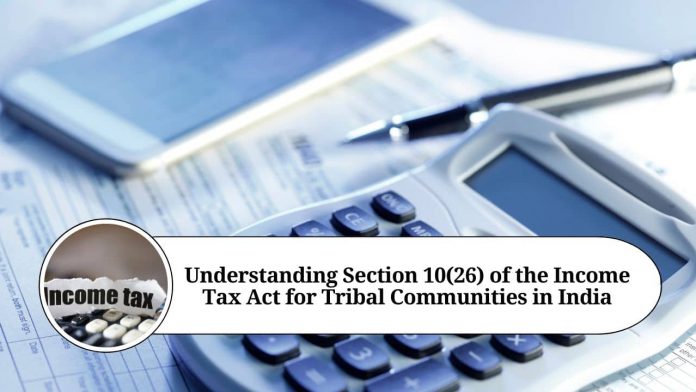India is a country with diverse cultures and traditions, and tribal communities have been an integral part of this diversity. These communities are known for their unique lifestyle, customs, and practices. However, due to their geographical isolation, economic backwardness, and lack of access to basic amenities, they have always remained in a disadvantageous position.
The government of India has taken several initiatives to improve the socio-economic condition of these communities. One such initiative is the provision of tax exemption under section 10(26) of the Income Tax Act, of 1961. In this article, we will discuss the provisions of section 10(26) in detail and understand its implications for tribal communities.
What is Section 10(26)?
Section 10(26) of the Income Tax Act, 1961 provides for tax exemption to members of Scheduled Tribes in India. This section exempts the income of a person who belongs to a Scheduled Tribe from tax if the income is earned from any source located in a tribal area. The tribal areas are notified by the central government and include areas where tribal communities are predominant.
Who is eligible for tax exemption under Section 10(26)?
To be eligible for tax exemption under section 10(26), the person should belong to a Scheduled Tribe. The term ‘Scheduled Tribe’ is defined in Article 366(25) of the Constitution of India. The list of Scheduled Tribes is notified by the President of India under the Constitution (Scheduled Tribes) Order, 1950. The person should also be a resident of a tribal area as notified by the central government. The income should be earned from any source located in the tribal area.
What is a tribal area?
A tribal area is a geographical area where Scheduled Tribes are predominant. The central government notifies these areas under the Fifth and Sixth Schedule of the Constitution of India. The Fifth Schedule provides for the administration and control of Scheduled Areas and Scheduled Tribes in these areas. The Sixth Schedule provides for the administration of tribal areas in the northeastern states of Assam, Meghalaya, Tripura, and Mizoram.
What is the extent of tax exemption under Section 10(26)?
The entire income of a person who belongs to a Scheduled Tribe and is a resident of a tribal area is exempt from tax if the income is earned from any source located in the tribal area. However, if the person earns income from a source outside the tribal area, that income will be taxable as per the provisions of the Income Tax Act.
Implications of Section 10(26) for tribal communities:
Section 10(26) of the Income Tax Act has significant implications for the socio-economic development of tribal communities. It provides tax relief to the tribal people who are often economically backward and lack access to basic amenities. The tax exemption enables the tribal people to retain their income and utilize it for their socio-economic upliftment. This provision also helps to bridge the gap between the urban and rural areas and encourages development in the tribal areas.
Conclusion:
Section 10(26) of the Income Tax Act, of 1961 provides tax relief to members of Scheduled Tribes in India. The provision exempts the income of a person who belongs to a Scheduled Tribe and is a resident of a tribal area from tax if the income is earned from any source located in the tribal area.
Other Useful Links:
This provision has significant implications for the socioeconomic development of tribal communities. It provides tax relief to the tribal people and encourages development in the tribal areas. The government of India should continue to take initiatives to improve the socio-economic condition of tribal communities and ensure that they receive the benefits of tax exemption provided under Section 10(26).
Frequently Asked Questions:
Q: What is section 10(26) of the Income Tax Act?
A: Section 10(26) of the Income Tax Act provides an exemption from tax on certain types of income earned by certain categories of individuals.
Q: Who is eligible for the exemption under section 10(26)?
A: The exemption under section 10(26) is available to individuals belonging to certain specified categories such as members of scheduled tribes, members of scheduled castes, and members of certain other backward classes.
Q: What types of income are exempted under section 10(26)?
A: Section 10(26) provides an exemption from tax on certain types of income earned by eligible individuals such as income from any source which accrues or arises to such individuals by way of any scholarship, stipend, or any other similar payment.
Q: Is the exemption under section 10(26) available to all members of scheduled tribes, scheduled castes, and other backward classes?
A: No, the exemption is available only to individuals who are specifically notified by the central government as belonging to the specified categories.
Q: How do individuals claim an exemption under section 10(26)?
A: Individuals claiming exemption under section 10(26) need to provide the necessary documents and certificates proving their eligibility for the exemption to the tax authorities.
Q: Is there any limit on the amount of income that can be exempted under section 10(26)?
A: There is no limit on the amount of income that can be exempted under section 10(26). However, individuals need to meet the eligibility criteria and provide the necessary documents to claim the exemption.
Q: Is the exemption under section 10(26) applicable to all types of taxes?
A: The exemption under section 10(26) applies only to income tax and not to other types of taxes such as goods and services tax (GST).
Q: Are there any conditions or restrictions for claiming exemption under section 10(26)?
A: Yes, individuals claiming exemption under section 10(26) need to meet the eligibility criteria and provide the necessary documents to prove their eligibility. Additionally, the exemption is available only to certain types of income and applies only to income tax.




















